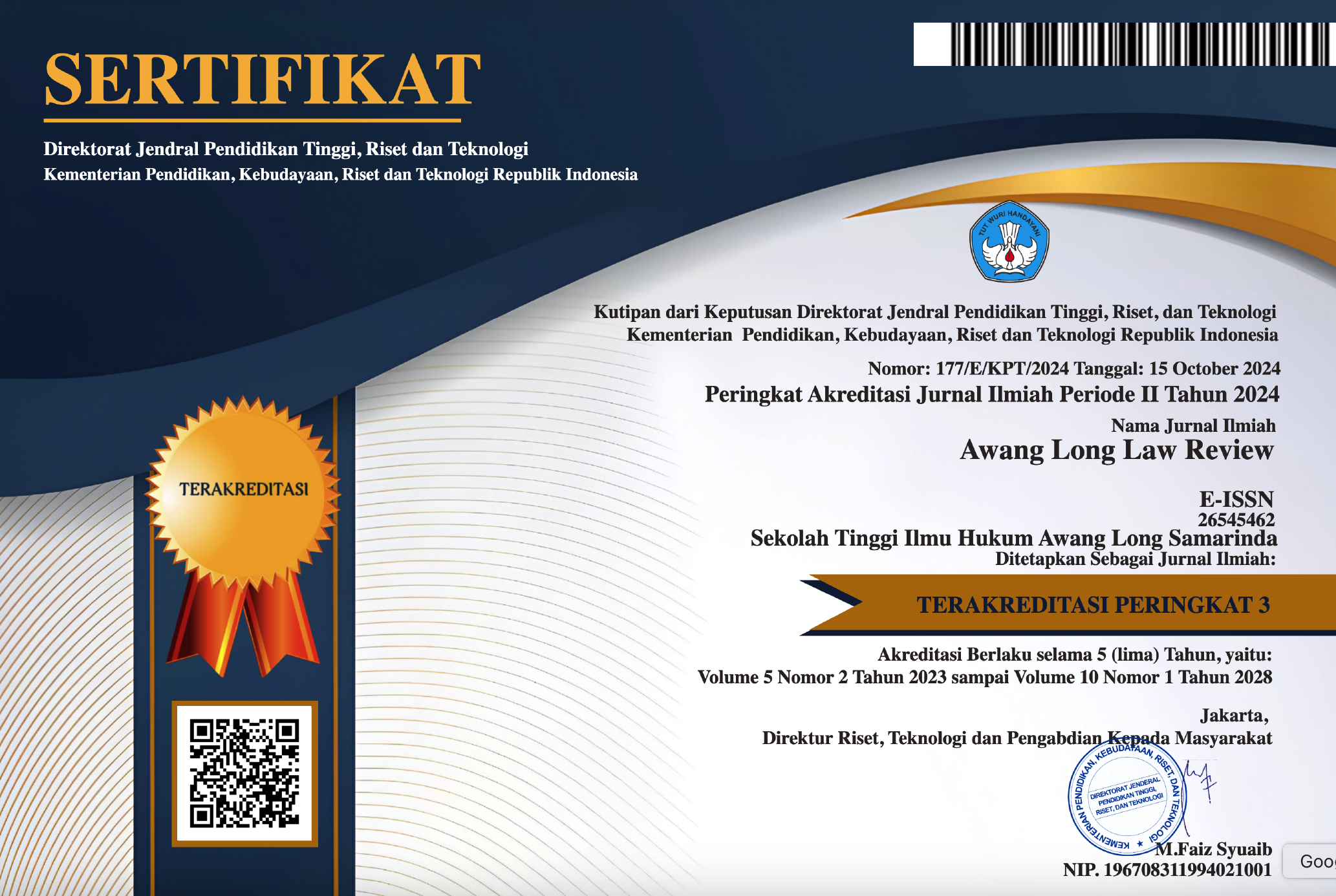SEMA BINDING STRENGTH NO. 2/2023 REGARDING THE JUDGE'S DETERMINATION IN APPLICATIONS FOR REGISTRATION OF INTERFAITH MARRIAGES
Abstract
The state guarantees freedom of religion, as well as forming a marriage. Registration of marriages, especially mixed marriages, is regulated in Article 57 of Law no. 16 of 2019 concerning Marriage. This mixed marriage is also related to interfaith marriage which is also a right for Indonesian citizens. The Supreme Court in this case made SEMA No. 2/2023 dated 17 July 2023 concerning Appointments for Judges in Adjudicating Cases on Applications for Registration of Marriages Between People of Different Religions and Beliefs, at point No. 2 explains that "The court did not grant the request for registration of marriages between people of different religions and beliefs." If this SEMA is analyzed it is in conflict with Article 35 letter (a) of Law no. 23 of 2006 in conjunction with Article 50 of Minister of Home Affairs Regulation no. 108/2019. Therefore, the author analyzes the binding strength of SEMA No. 2/2023 dated 17 July 2023 regarding the failure to grant the request for registration of interfaith marriages. Meanwhile, Minister of Home Affairs Regulation no. 108/2019 states that interfaith marriages must be proven, which automatically results in an application being made to the court. This is also related to Article 35 letter (a) of Law no. 23 of 2006 concerning Population Administration which regulates marriages determined by courts for people of different religions. Therefore, the author analyzes the above problem with the problem, namely the binding force of SEMA No. 2/2023 regarding the judge's decision in the application for registration of interfaith marriages. The method used is normative juridical research, with an analysis of the theory of authority and legal certainty. The approaches used are the conceptual approach, statutory approach and case approach. The conclusion to be reached in this writing has future perspective value and is in accordance with its axiology, namely the aim of law is justice.
Downloads
References
Asmin, Status of Inter-Religious Marriages, Viewed from Marriage Law no. 1/1974, (Jakarta: PT. Dian Rakyat, 1986).
Cahyadi, The Position of the Supreme Court Circular Letter (SEMA) in Positive Law in Indonesia, Brawijaya University, Malang, 2014, without pages in Raihan Andhika Santoso, et al., The Position and Legal Strength of the Supreme Court Circular Letter Sema), Indonesian Positive Law, Deposition: Journal of Legal Science Publications, Vo. 1, No. December 4, 2023.
CST Kansil and Christine ST Kansil, Introduction to Indonesian Legal Studies, (Jakarta: Rineka Cipta, 2014).
Dewi Astutty Mochtar and Dyah Ochtorina Susanti, Introduction to Legal Science, (Malang: Banyumedia Publishing, 2012).
Deposition: Journal of Legal Science Publications, Vo. 1, No. December 4, 2023.
Erleni, Legal Legality of Interfaith Marriages in Indonesia, Lex Librum: Journal of Legal Studies, Vol. 9 No. December 1, 2022.
Icha Satriani, Position of Supreme Court Circular Letters, Hasanuddin University Makassar, 2015, no pages, in Raihan Andhika Santoso, et al., Position and Legal Strength of Supreme Court Circular Letters (Sema), Indonesian Positive Law.
Jane Marlen Makalew, Legal Consequences of Interfaith Marriages in Indonesia, Journal: Lex Privatum, Vol. 1, No. 2 April-June 2013.
Made Widya Sekarbuana, et al, Interfaith Marriages in Human Rights Perspective in Indonesia, Journal of Legal Preferences, Vol. 2, no. February 1, 2021.
Maria Farida, Legal Studies, (Yogyakarta: Kanisius, 1998).
Muhammad Yasin, Position and Legal Strength of the Supreme Court Circular Letter (Sema), 2013, In Raihan Andhika Santoso, et al, Indonesian Positive Law, Deposition: Legal Science Publication Journal, Vo. 1, No. December 4, 2023.
Legal Science Publications, Vo. 1, No. December 4, 2023.
Fourth Amendment to the Constitution of the Republic of Indonesia on August 10 2002.
Rachmadi Usman, Civil Registration Law, (Jakarta: Sinar Grafa, 2019).
R. Soeroso, Introduction to Legal Studies, (Jakarta: Sinar Graphics, 2021).
Salim HS, Introduction to Written Civil Law (BW), (Jakarta: Sinar Graphics, 2003).
Saputra, A., This is the Position of SE Hate Speech in the Sequence of RI Regulations https://news.detik.com/berita/d-3059328/begini-kedunian-se-i-hate-speech-i-dalam-tata-aturan -peraturan-ri, 2015 in Raihan Andhika Santoso, et al., Position and Legal Strength of Supreme Court Circular Letters (Sema), Indonesian Positive Law, Deposition: Journal.
Sindy Cantonia and Ilyas Abdul Majid, Juridical Review of Interfaith Marriages in Indonesia from the Perspective of Law and Human Rights, Lex Generalis Law Journal, Vol. 2, no. June 6, 2021.
Wedya Laptala, Implementation of Interfaith Marriages in a Juridical Perspective (Case Study in District Courts), Jurisprudence, Vol. 4, no. September 2, 2014.
Copyright (c) 2024 Cliff Ivan Leonide, M. Khoidin, Emi Zulaika, Herowati Poesoko, Ivida Dewi Amrih Suci

This work is licensed under a Creative Commons Attribution-ShareAlike 4.0 International License.







